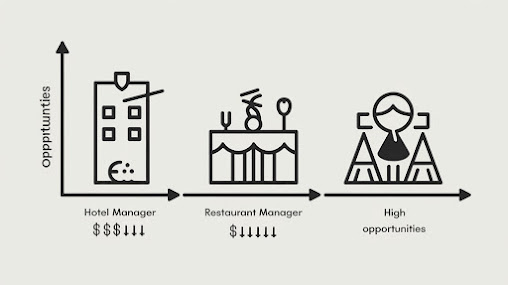Are you someone who dreams of running a five-star hotel, managing an exquisite restaurant, or traveling the world while working in the hospitality industry? If yes, you're on the right track! Hotel Management opens up a world of exciting opportunities, and there’s no better time to dive into this field than now. Whether you're fresh out of school or looking to specialize further, here’s a guide to getting started.
Why Choose Hotel Management?
Hotel Management is not just about managing hotels—it’s about managing experiences. It equips you with the skills to handle the dynamic and diverse needs of the hospitality and tourism industry. From event planning to luxury management, food services to guest relations, this field offers a wide variety of career paths.
If you're in Kolkata, you're lucky to have one of the best hotel management colleges in Kolkata, like SBIHM, which are known for preparing students for real-world challenges in the hospitality sector.
Starting Early: Courses After 12th
Wondering what to do after school? An after 12th hotel management course is a great way to build your foundation. These programs are designed to introduce you to the basics of the industry, covering everything from hospitality operations to culinary arts.
A popular option is pursuing a Bachelor in Hotel Management, a three- to four-year program that blends theoretical knowledge with practical exposure. Colleges like SBIHM provide hands-on training and internships, ensuring students are job-ready.
For those with a knack for cooking, a culinary arts course is an excellent choice. It focuses on the art and science of cooking, making it perfect for aspiring chefs. Check out SBIHM’s Culinary Arts Course to get started.
Advancing Your Career
Already have a bachelor's degree and looking to specialize? This is where advanced programs like Masters in Hotel Management and MBA in Hotel Management come into play.
A Masters in Hotel Management dives deeper into areas like hotel operations, marketing, and financial management. It’s ideal for those who aim for leadership roles in the industry.
On the other hand, an MBA in Hotel Management blends business acumen with hospitality skills, preparing you for roles like general manager, event manager, or even a consultant. These courses are highly valued, especially in global markets.
Choosing the Right Course and College
With so many options, it’s essential to pick the right course and institution. Factors like curriculum, industry tie-ups, and practical exposure make a huge difference. Colleges like SBIHM are renowned for offering a range of hotel management courses, ensuring students gain a holistic understanding of the industry.
If you're passionate about culinary arts, they also provide specialized training through their Culinary Arts Course, which is perfect for aspiring chefs or food entrepreneurs.
What’s Next?
The hospitality industry is growing rapidly, with endless opportunities for creative and hardworking individuals. The journey might start with an hotel management course after 12th, but it doesn’t have to end there. Whether it’s a Bachelor in Hotel Management, a Masters in Hotel Management, or a niche program like culinary arts, there’s a course for everyone.
So, why wait? Explore the world of hotel management courses and set your career in motion with institutions like SBIHM. Who knows? You might be managing your dream property or running a Michelin-starred kitchen sooner than you think!
Ready to take the plunge? Start your journey today and see where it leads!





